In a recent Jot we looked at the way Sir Max Beerbohm ‘ improved ‘ certain books in his library by adding illustrations to them or altering their printed illustrations to make a point about the authors. Some of these books were inscribed to him by the authors, but that didn’t seem to bother Beerbohm. On occasion he would also add false inscriptions from famous people, such as Queen Victoria.
The source of information concerning these amusing interventions may have been the catalogue of ‘ The Library and Literary Manuscripts of the late Sir Max Beerbohm ‘that Sotheby & Co issued to accompany the sale of the author and artist’s library on 12 and 13thDecember 1960. Beerbohm had died in ( ) and his widow followed him on ( ).
Anyone wishing to obtain some idea of Beerbohm’s literary likes and dislikes could hardly do better than to study this catalogue, which is profusely illustrated. It is quite obvious that he didn’t take to Rudyard Kipling and the feeling was probably mutual.
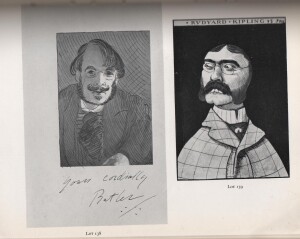
Here is a description of Lot 136.
KIPLING ( RUDYARD) BARRACK-ROOM BALLADS and other verse; the illustration on the title-page altered by Max Beerbohm into a portrait of Kipling, blood dripping from his red fingernails; signature of Beerbohm and an inscription: ‘H.M.B. from F.H.H. on fly-leaves, original cloth. 8vo 1892
And here is Lot 137.
KIPLING (RUDYARD) A Diversity of Creatures , Max Beerbohm has introduced a pen-and-ink caricature portrait of Kipling, behind bars, into the design facing the title-page, and under the author’s name has written: ‘the Apocalypic (sic) Bounder who can do such fine things but mostly prefers to stand ( on tip-toe and stridently) for all that is cheap and nasty’; pen-scoring on last page, original limp red calf gilt 8vo Macmillan and Co., 1917
And Lot 139
Le Gallienne (Richard) RUDYARD KIPLING, A CRITICISM, inscribed on fly-leaf by the author : ‘ For Max from Dick. June 1900’, the portrait of Kipling altered by Max Beerbohm into a bitterly satiric caricature, and the title changed from ‘ Rudyard Kipling ‘ to ‘Rudyard Kipling’s soul’, original cloth, the leaf bearing the portrait detached and fore-edge frayed. 8vo 1900.
And lot 239
To the frontispiece of Frederick Whyte’s A Bachelor‘s London(1931), which features a drawing by Josephine Harrison entitled ‘ The House of the Light that Failed ‘, Beerbohm has added a pencil caricature of Kipling and four lines of verse parodying the poet:
Fred Whyte ‘e done me bloody proud,
So to Je’ovah Thunder-browed
Says I, “ O Jah, be with me yet,
Lest I forget, lest I forget.”
Continue reading


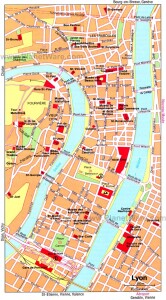
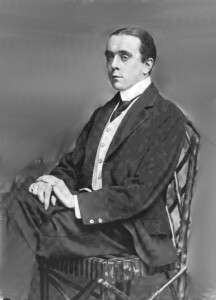
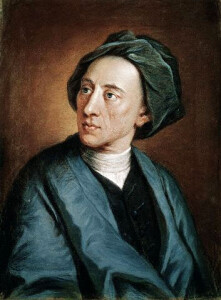
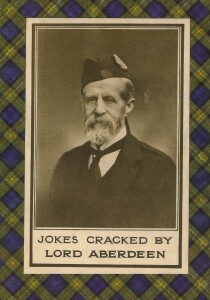
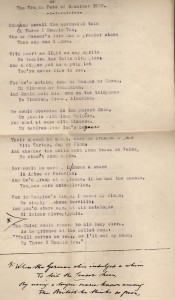
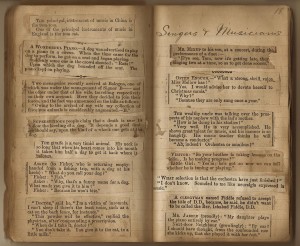
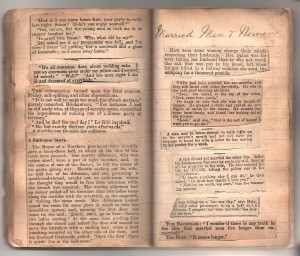 In an earlier Jot we selected at random some pretty witty items from an Edwardian comic’s gag book composed of clippings from newspapers and magazines. Here are some more. Astonishingly, most sound so very modern in their style of humour. None of them contain puns.
In an earlier Jot we selected at random some pretty witty items from an Edwardian comic’s gag book composed of clippings from newspapers and magazines. Here are some more. Astonishingly, most sound so very modern in their style of humour. None of them contain puns.
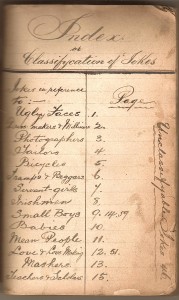 Found at Jot HQ the other day a small scrapbook containing pasted in humorous cuttings from magazines and newspapers that once belonged to the late prankster Jeremy Beadle (1948 – 2008). The date 1897 on the cover was very likely the year in which the compilation was begun, since many of the jokes and anecdotes are clearly of a later date. The high quality of much of the material strongly suggests that the compiler may have been a comedian of some sophistication who was prepared to devote a long period in search of the best gags.
Found at Jot HQ the other day a small scrapbook containing pasted in humorous cuttings from magazines and newspapers that once belonged to the late prankster Jeremy Beadle (1948 – 2008). The date 1897 on the cover was very likely the year in which the compilation was begun, since many of the jokes and anecdotes are clearly of a later date. The high quality of much of the material strongly suggests that the compiler may have been a comedian of some sophistication who was prepared to devote a long period in search of the best gags.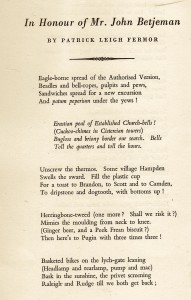
 This is a paperback published in California and written by two American stand up comedians, John Carfi and Cliff Carle, of ‘ funny ‘ messages that could be left on answering machines. It appeared in 1983, which means that quite a few of the jokes might not be acceptable in the more PC climate of 2018.
This is a paperback published in California and written by two American stand up comedians, John Carfi and Cliff Carle, of ‘ funny ‘ messages that could be left on answering machines. It appeared in 1983, which means that quite a few of the jokes might not be acceptable in the more PC climate of 2018.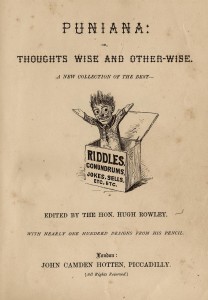
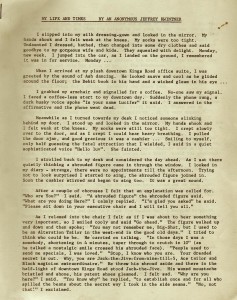
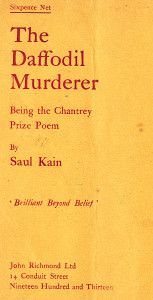 Found – a rather battered copy of Siegfried Sassoon’s early book The Daffodil Murderer (1913) published under the pseudonym ‘Saul Kain.’ In decent condition it has auction records like this from Bloomsbury Book Auctions in April 2009:
Found – a rather battered copy of Siegfried Sassoon’s early book The Daffodil Murderer (1913) published under the pseudonym ‘Saul Kain.’ In decent condition it has auction records like this from Bloomsbury Book Auctions in April 2009: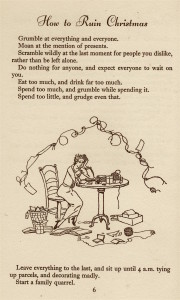
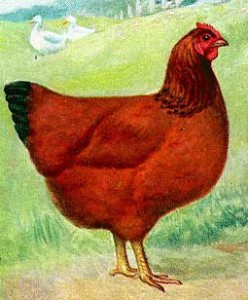
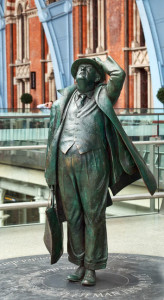 Found- in a copy of Nip in the Air (John Murray 1974) a book of poems by John Betjeman this affectionate parody by the esteemed travel writer Patrick (‘Paddy’) Leigh Fermor. It is probably from a magazine (pp 379-380), possibly The London Magazine but is not archived anywhere online. It is probably from the 1970s. It deserves a place in a completist Betjeman collection and in any future collection of
Found- in a copy of Nip in the Air (John Murray 1974) a book of poems by John Betjeman this affectionate parody by the esteemed travel writer Patrick (‘Paddy’) Leigh Fermor. It is probably from a magazine (pp 379-380), possibly The London Magazine but is not archived anywhere online. It is probably from the 1970s. It deserves a place in a completist Betjeman collection and in any future collection of